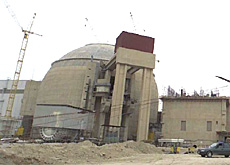Swiss engineer arrested in Libyan nuclear probe

A Swiss engineer suspected of helping Libya obtain nuclear weapons technology has been arrested in Germany.
Switzerland’s federal prosecutor has also opened an investigation into two Swiss suspected of illegally exporting nuclear bomb-making equipment to the North African country.
The engineer arrested in Germany is believed to have been part of a clandestine international network, which helped supply equipment to the Libyan government.
Authorities allege that 39-year-old Urs Tinner oversaw machine work in Malaysia on gas centrifuge parts that were intercepted by Western intelligence last October on a ship bound for Libya. They claim he also trained Libyans in their use.
Gas centrifuges are needed to enrich uranium for use in nuclear weapons.
Treason charges are being prepared against the suspect, who was arrested on Thursday in Hessen, said German federal prosecutors.
Swiss and German officials did not release the suspect’s name, but an investigative source confirmed to the Associated Press that the man arrested last week was Tinner.
Tinner is accused of supervising the production of more than 2,000 centrifuge parts at a Malaysian company between 2001 and 2003 at the request of a Sri Lankan who allegedly worked as the middleman between the network and Libya.
Uranium enrichment
The parts were shipped to Dubai and loaded onto a German-registered freighter headed for Libya, according to a prosecution statement.
Intelligence officials got wind of the shipment and had the freighter diverted in the Mediterranean to Taranto, Italy, where its cargo was seized.
A Malaysian police report in February named Tinner and his father as having overseen machine work on centrifuge parts at Malaysian-based Scomi Precision Engineering, also known as SCOPE.
Swiss authorities have been investigating whether he broke Swiss law by knowingly contributing to the production of nuclear weapons by making precision parts in Malaysia destined for Libya.
The State Secretariat for Economic Affairs, which carried out the initial investigations, passed on the case to the federal prosecutor at the end of September.
The prosecutor’s office, has now launched investigations against two Swiss nationals suspected of breaking the country’s law on war material. A spokesman would neither deny or confirm whether Tinner was one of the suspects.
If eventually convicted of any wrong-doing, either man could face up to ten years in jail and fines worth SFr5 million ($3.97 million).
Pakistani scientists
Tinner’s family in Switzerland has confirmed that he worked for SCOPE as a technical consultant for three years, but said he was unaware of the destination of the machinery parts he made.
In August German authorities arrested Gerhard Wisser, who is accused of attempting to supply pipes to Libya for use in uranium enrichment. He was released on bail, but re-arrested in South Africa in September.
Another German citizen is also being investigated on suspicion of arranging the supply of nuclear arms equipment to a foreign state, believed to be Iran.
The International Atomic Energy Agency, the United Nations nuclear watchdog, said in January that Pakistani scientists were involved in selling technology to Iran, Libya and North Korea.
Islamabad detained several scientists, including Abdul Qadeer Khan, the father of Pakistan’s atomic bomb.
Libyan leader Muammar Gaddafi renounced his banned weapons programmes in December in a dramatic turnaround. The move was seen as an attempt to help rebuild relations with the West.
On Monday the European Union ended 12 years of sanctions against Libya and eased an arms embargo.
The United States lifted most of its commercial sanctions in April after Gaddafi abandoned his weapons programmes.
swissinfo with agencies
Earlier this year, the IAEA supplied the Swiss authorities with a list of two companies and 15 individuals suspected of dealing in nuclear material with Iran and Libya.
Official investigations were launched into the matter, and in Tinner’s case, the inquiry has now been turned over to the federal prosecutor.
Tinner’s name was also cited in a Malaysian police report as having overseen the development of parts needed for uranium enrichment, parts that were allegedly shipped to Libya.

In compliance with the JTI standards
More: SWI swissinfo.ch certified by the Journalism Trust Initiative










You can find an overview of ongoing debates with our journalists here . Please join us!
If you want to start a conversation about a topic raised in this article or want to report factual errors, email us at english@swissinfo.ch.